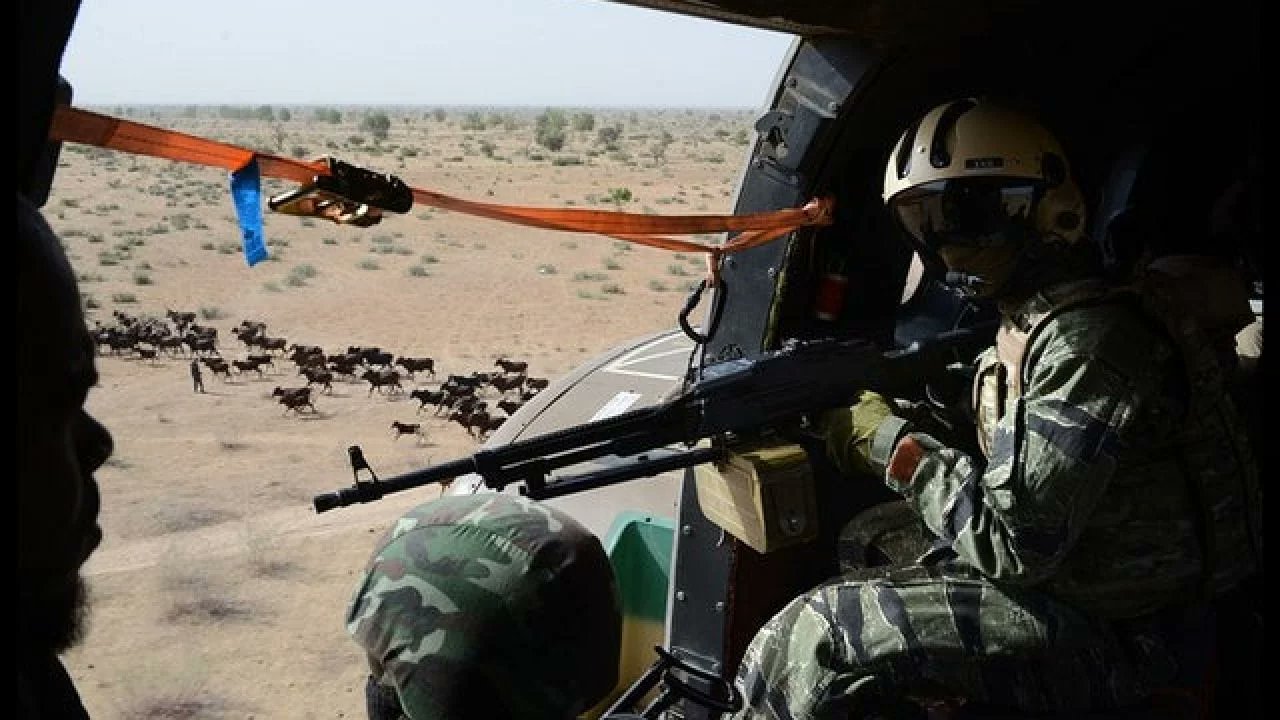The Nigerian Air Force (NAF), under Operation Hadin Kai, conducted precision airstrikes on Boko Haram strongholds in Tumbumma Baba and Chiralia, located in the Southern Tumbuns region of Borno State. Acting on credible intelligence, NAF aircraft targeted terrorist structures used for storage and operational coordination, delivering direct hits that disrupted planned attacks aimed at sabotaging Eid-el-Kabir celebrations. Air Commodore Ehimen Ejodame, Director of Public Relations and Information at NAF Headquarters, confirmed that the strikes neutralized several terrorists and destroyed key logistics infrastructure, significantly weakening the insurgents’ operational capacity.
The airstrikes were strategically timed to preempt terrorist activities during the festive period, a time when Boko Haram has historically escalated attacks to instill fear and disrupt civilian life. Battle Damage Assessments conducted post-operation verified the destruction of critical terrorist assets, including storage facilities and coordination hubs, which were essential to their planned disruptions. This operation underscores the NAF’s commitment to leveraging intelligence-driven air interdiction to protect civilian lives and support Nigeria’s broader national security objectives in the fight against insurgency.
Boko Haram, a Nigeria-based jihadist group aiming to overthrow the government and establish an Islamic state, has been a persistent threat in the northeast since 2009, responsible for tens of thousands of deaths and the displacement of over 2 million people. The Southern Tumbuns, particularly areas like Tumbumma Baba and Chiralia, have long served as hideouts due to their remote terrain, providing cover for insurgents to regroup and plan attacks. The NAF’s recent strikes reflect a proactive approach to dismantling these enclaves, building on previous successes in the region, such as earlier operations in Chikide and Degbewa, where notorious terrorist leaders were targeted.
The operation’s success was bolstered by enhanced coordination between air and ground forces under Operation Hadin Kai, a multi-agency counterterrorism effort involving the Nigerian Army, Navy, and other security agencies. Intelligence reports indicated that the targeted sites were active hubs for Boko Haram’s logistical operations, including weapon storage and planning for coordinated attacks. By neutralizing these facilities, the NAF disrupted the group’s ability to execute large-scale operations, particularly during high-profile events like Eid celebrations, which are often exploited for maximum impact.
Despite these gains, the broader conflict with Boko Haram and its splinter faction, the Islamic State West Africa Province (ISWAP), remains complex, with both groups continuing to pose significant threats in Borno and neighboring states. The NAF’s airstrikes are part of a sustained campaign to degrade terrorist capabilities, but challenges such as the group’s resilience, internal factionalism, and the exploitation of ungoverned spaces persist. The Nigerian military’s efforts are further complicated by past incidents of erroneous airstrikes, which have raised concerns about civilian safety and the need for improved targeting protocols to avoid collateral damage.
The NAF’s statement emphasized that these airstrikes were a direct response to intelligence about imminent threats, highlighting the importance of preemptive action in counterterrorism. Air Commodore Ejodame noted that the operation not only neutralized immediate dangers but also sent a strong message to insurgents about the military’s resolve to protect civilians and maintain stability. The destruction of logistics structures is expected to limit Boko Haram’s mobility and resource access in the short term, though sustained operations will be necessary to prevent the group from regrouping.
This latest operation adds to a series of successful NAF airstrikes in 2025, including a March strike in Chikide and Degbewa that targeted a fortified command hub in the Mandara Mountains. The NAF’s use of precision night warfare capabilities and improved intelligence-gathering techniques has enhanced its effectiveness against elusive targets in challenging terrains like the Tumbuns and Sambisa Forest. However, the military continues to face scrutiny over past incidents, such as the 2017 Rann airstrike that killed 115 civilians, underscoring the need for rigorous safeguards to protect non-combatants.
The Nigerian government and military remain committed to eradicating Boko Haram and ISWAP, with Operation Hadin Kai serving as a cornerstone of these efforts. The operation’s multi-faceted approach combines air superiority with ground offensives and regional cooperation through the Multinational Joint Task Force (MNJTF), involving troops from Nigeria, Niger, Chad, and Cameroon. These collaborative efforts have yielded results, such as the reported killing of several high-ranking terrorist commanders in 2022 and 2023, though the insurgency’s adaptability continues to challenge security forces.
Highlighting the precision and impact of the strikes. However, these posts also call for more transparency, such as the release of video evidence, to bolster public confidence in the military’s operations. While these sources provide valuable insight into public reactions, they remain inconclusive without official corroboration and should be viewed as supplementary to verified reports.
The NAF’s ongoing campaign against Boko Haram is part of a broader strategy to address Nigeria’s multifaceted security challenges, including banditry in the northwest and separatist violence in the southeast. The military’s ability to maintain pressure on terrorist groups while minimizing civilian harm will be critical to sustaining public trust and achieving long-term stability. The recent airstrikes in Tumbumma Baba and Chiralia demonstrate the NAF’s evolving capabilities and determination to disrupt terrorist networks, but the fight against insurgency remains a long-term endeavor requiring sustained effort and precision.




